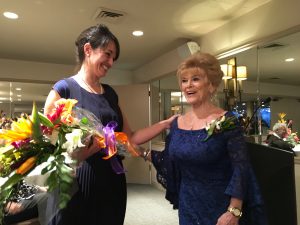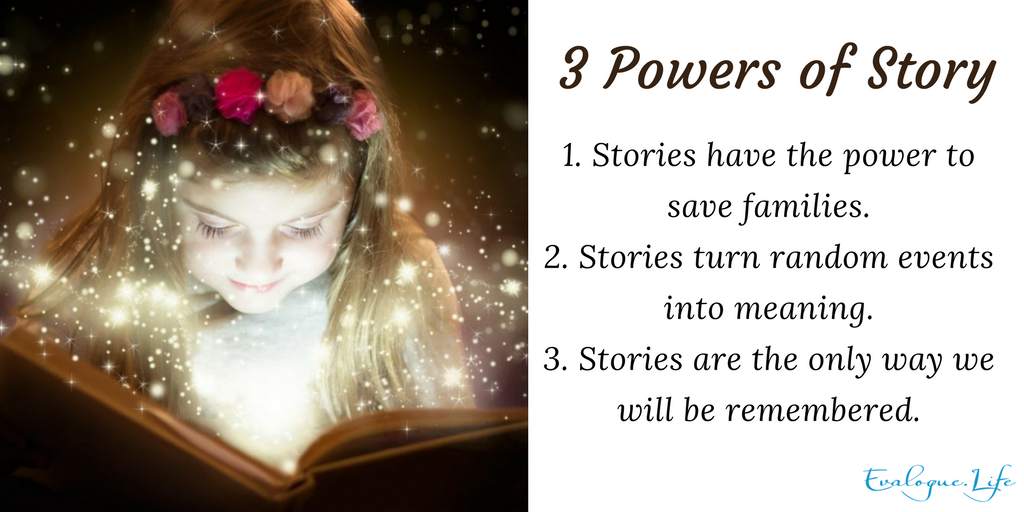
Lately I have been intensively noodling on a philosophical idea related to story endings. It is this: when you tell your personal story, it changes the ending.
First, a little backstory
When I started writing my parents’ story in 2007, I wanted to honor them, but I had no idea it would lead anywhere else. What I thought would be a short family history turned into a book, which led to another and then another. So, I founded Evalogue.Life, brought on Rachel Trotter, and we’re now doing this work full-time. (That’s the abridged version of a decade).
Somewhere along the way, I noticed a phenomenon I tucked away as a mental note like, “This is interesting. What is going on here?” What I noticed was that as I worked with living people to tell their stories, they began to grow and change in unexpected ways, right before my eyes.
When I first began this work, I thought telling someone’s life story was a retrospective activity, looking back to see what happened in the past. I thought of it like reading a history book. What I did not expect, was that examining the past affects the storyteller.
When you tell your story, it changes the ending
We have now worked with many clients, which has given us a bigger sample size. Now, I can confidently say that every time we work with a client on their story, they grow as a result. (And frankly, so do we). The outcome is always the same: when they tell us their story, we reflect it back to them in a way that is like holding up a mirror. Together, we examine what it means, and this naturally causes the subject to think about their own story endings they have not yet lived. As a direct result of processing this together, people complete unfinished business. They may take the opportunity to say things that their loved ones need to hear. Opportunities spontaneously arise to conquer a fear or grow in unexpected ways.
Examples of people growing as they write the ending:
One example is when I helped Norma Kier write her book. Her greatest fear was public speaking, and as we neared completion of her book, she accepted the invitation to tell her story to a room of 500 people. She sparkled, and we wrote that experience as the closing scene of her book. We wrote it as she lived it.

Another example comes from working with Rob A. Gentile as he wrote his near-death experience, Quarks of Light: What I saw that opened my heart. We intensively processed the story arc and searched for language to describe the unexplainable. Each time he found the words, it deepened his understanding of what had happened and what it meant to him. As he did research, he also grew. During the process of writing, he was able to connect to the family of the pwerson who donated his heart. He then formed friendships with them. They heard his heart beating on a monitor, which was a profound experience for everyone. He wrote about that. Through this process, he became a best-selling author and speaker, forming strong relationships and inspiring others. He came out the other side a changed person. How could he not?
I’ve had my own experiences with growing due to telling a story. One example was a few years ago when I reached out to my brother about making my grandma’s dumpling soup together because I wanted to make a video about it. I invited him and his family over for chicken dumpling soup, and in doing so, my brother and I came together. We talked in a way we had not in years. Bonding over a family food tradition opened the door to reconnect and heal old wounds. Today, we are very close again. It started with a family recipe.
We had that initial conversation as a direct result of my wanting to tell the story of our grandma’s dumplings.
How youth can write the ending to their own stories:
As an example of the power of storytelling, we teamed up with an arts nonprofit for youth in our community called Nurture the Creative Mind, as well as our local inner-city school district, the school foundation, and the Boys and Girls Club to teach youth storytelling classes. We received a grant to help a small group of teenagers process their own stories. The project was transformative for these youth. You can read about that project here:
Related article: The power in youth and storytelling
I could go on and on with examples like this, but now, I want to shift and provide other evidence.
The Hawthorne effect – why conducting a study influences the outcome:
One reason this happens relates to the Hawthorne Effect. This refers to a now-famous experiment in an industrial setting where researchers wanted to study what would happen to productivity if they brightened the factory lights. Voila, productivity increased. But here is the hitch. They found that productivity also went up when they dimmed the lights.
They then had the groundbreaking realization of what the key variable was: the very act of conducting the study. In other words, when people knew they were being studied, they were more productive.
I suspect that the same thing happens when we tell life stories: the act of studying a person’s life changes their life—for the better. This is especially the case when we go through the storyboarding exercise, looking for threads of growth and change. The exercise causes people to view their lives in new ways.
So, one of our mantras here at Evalogue.Life is that every great story is about transformation.
What we did not realize at first—is this:
The very act of telling your story is transformative.
Once I identified this phenomenon, it became like when you get a new car and you see that model everywhere. I now notice examples of this phenomenon everywhere. Compelling research by others backs this up, and we have our own filing cabinet of anecdotes.
This philosophy has become an underpinning theme for the rest of our work.
Narrative therapy and therapeutic journaling
Further evidence for the power of personal storytelling comes from a branch of psychology called “Narrative therapy.” An article in Psychology Today defines it this way:
Narrative therapy is a form of counseling that views people as separate from their problems. This allows clients to get some distance from the issue to see how it might actually be helping them, or protecting them, more than it is hurting them. With this new perspective, individuals feel more empowered to make changes in their thought patterns and behavior and “rewrite” their life story for a future that reflects who they are, what they are capable of, and what their purpose is, separate from their problems.
Psychology Today
How narrative therapy works
Psychology today explains the narrative therapy process this way:
In narrative therapy, the events that occur over time in a person’s life are viewed as stories, some of which stand out as more significant or more fateful than others. These significant stories, usually stemming from negative events, can ultimately shape one’s identity. Beyond this identity, the narrative therapist views a client’s life as multitiered and full of possibilities that are just waiting to be discovered.
Psychology today
On a related note, therapeutic journaling can be a powerful way to process your own story and to heal. Therapeutic journaling is considered an evidence-based treatment, which can be done as an alternative to or addition to therapy. Doing some diligent journaling on your own can greatly speed up and improve the benefits of formal therapy.
The U.S. Department of Veteran Affairs reports that therapeutic journaling is as effective as other interventions (such as counseling) for trauma. An article on their site states that,
“Therapeutic journaling can be done by keeping a regular journal to write about events that bring up anger, grief, anxiety, or joy that occur in daily life. It can also be used more therapeutically to deal with specific upsetting, stressful, or traumatic life events.”
The U.S. Department of Veteran Affairs
This protocol works by asking someone to write about a stressful or traumatic emotional experience for 3-5 sessions over several consecutive days for 15-20 minutes per session.
Consider adding a journal writing practice to any therapy. It can greatly enhance any therapy process.
Related article: How to start or boost a journal writing habit
Here is a recap of the power of story:
- Stories have the power to save families, helping children be more resilient in times of stress and creating closer family units.
- Stories turn random events into meaning. Story is how we learn, teach, and process the world around us.
- Stories are the only way we will be remembered. Without a story, one day we will simply be a name on a headstone. We connect with earlier generations when we know their stories, and if we want future generations to gain wisdom from our lives, we must be intentional and leave our story for them to find. This is like mailing a love letter to the future.
Related article: The power of story
Your ending is not yet written:
At Evalogue.Life, we have the seen the magic that happens when you understand that you are the hero in your own story, and the ending has not yet been written. When you come to see yourself this way, you have a framework to find meaning in difficult times.
We can each identify personal or family narratives that no longer serve us.
Here are some questions to ask yourself:
- What stories do you tell yourself?
- Are these narratives helpful or are they holding you back?
- What ending do you want for your own story?
In summary, we are all actors in our own stories and have power to write our own endings. Healing can occur when we focus on transformation that came because of the pain we went through in the past, or that we are currently experiencing.
Additional resources:
Here are some additional courses and tools for storyboarding to help you work through the “arc” or transformation in your own story. Not only does this framework make for compelling stories, but it is a powerful way to live. You begin to see that the hard parts of your story happen right before before the answers come.
Here are some additional resources:
- Click here for an overview article on how to storyboard, including a template
- Overview article on story structure
- Course on story structure, the building blocks of writing, and storyboarding
How will personal storytelling change you?
Have you thought about how your story might end? What will this life teach you and how will you grow by the time each episode concludes? How are you part of a multi-generational story that is still growing and changing? If you tell the story of your family, how might it strengthen your family and reinforce what’s positive about your culture? How will the challenges you face today, become pivotal turning points that helped you find new answers?

Rhonda Lauritzen is the founder and an author at Evalogue.Life – Tell Your Story. Rhonda lives to hear and write about people’s lives. She believes that when you tell your story, it changes the ending., She and her husband Milan restored an 1890 Victorian in Ogden. She especially enjoys unplugging in nature. Check out her books: How to Storyboard, and Every Essential Element. Recently she was the writing coach of bestselling author, Rob A. Gentile, who wrote Quarks of Light, A Near-Death Experience: What I Saw That Opened My Heart
Printable Storyboard Template

Storyboard any book, memoir, biography, or family history tale with our free printable template. It just might save your story.

